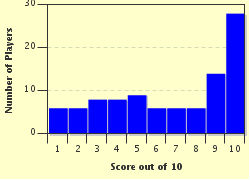Quiz Answer Key and Fun Facts
1. In the opening verses of Psalm 42, the writer compares his soul to what animal?
2. What does the psalmist say about his tears in verse 3 of Psalm 42?
3. In the fourth verse of Psalm 42, the author remembers when he used to journey to what place?
4. In Psalm 42:5, the author changes tone and asks "Why are you cast down?". Who is he addressing in this verse?
5. In verse 6 of Psalm 42 the author says that he will remember God in three different places. Which of the following is NOT one of them?
6. Psalm 42:7 introduced what poetic phrase into the lexicon?
7. In verse 8, the author expresses confidence. "The Lord will command his lovingkindness in the morning"--but what about nighttime?
8. How does the psalmist describe God in Psalm 42:9?
9. The author's enemies rebuke him by asking this question. What is it?
10. What genre does Psalm 42 best fit into?
Source: Author
lorance79
This quiz was reviewed by FunTrivia editor
CellarDoor before going online.
Any errors found in FunTrivia content are routinely corrected through our feedback system.

